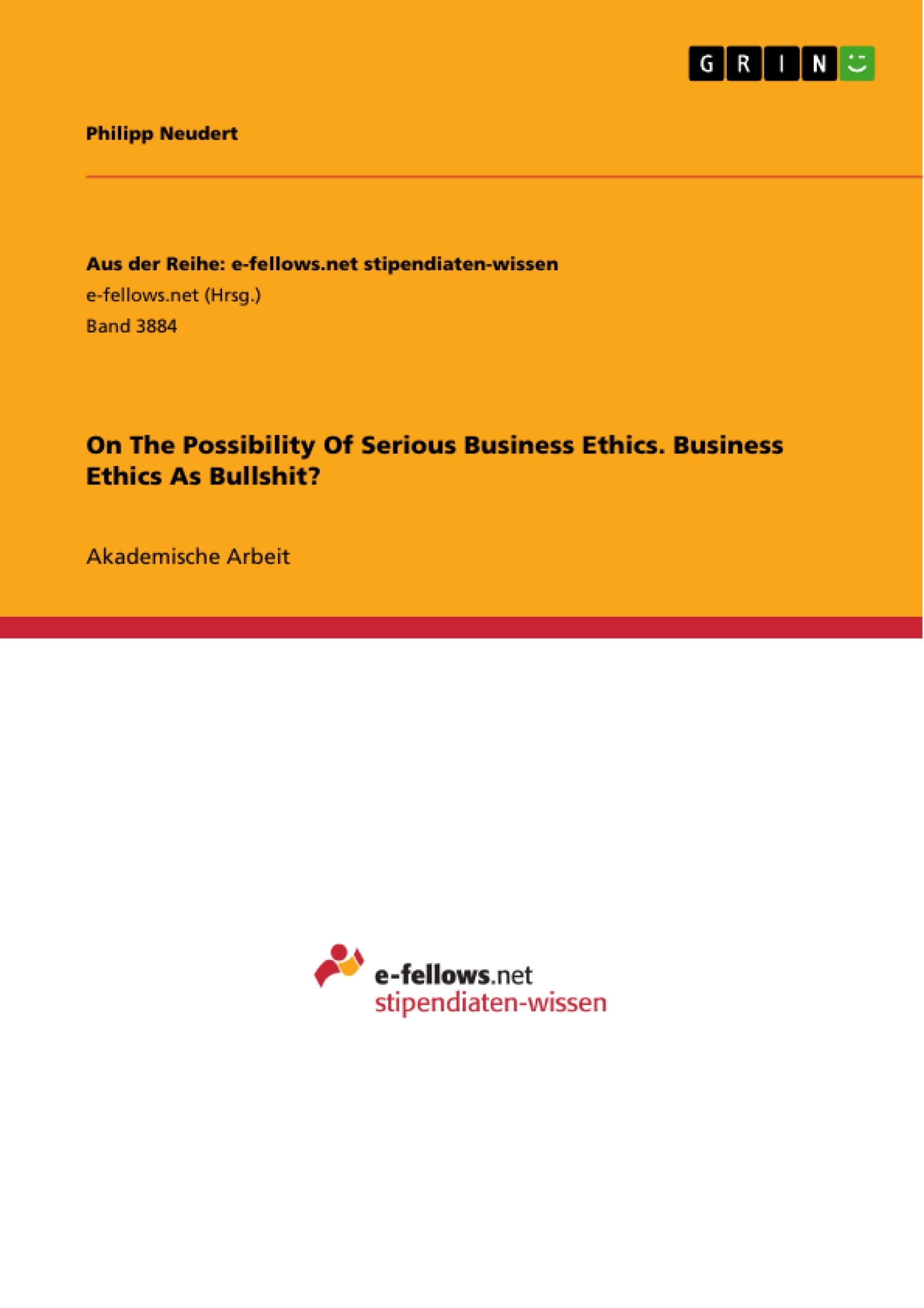Eventhough it is booming, business ethics is widely regarded as an oxymoron. Confronted with this fact, two views are plausible: First, business ethicists can be seen as pitiable and misguided idealists aiming for a goal that will stay out of their reach. Second, they can be regarded as suspicious and probably dishonest communication talents, artfully hiding the fact that they are doing nothing – that it is for them as business ethicist in fact impossible to do anything. When the latter view is true, business ethics would appear in the form of a secret, since it keeps it a secret that it does not exist, as Niklas Luhmann notes.
This and other notions of business ethics as dishonest refer to the broader claim: "Business ethics is bullshit". This claim will be examined in this paper. The aim of this examination is to argue that we can describe the conditions under which serious business ethics is possible and to offer this description. The argument is grounded on a negative notion of ‘serious business ethics': Business ethics is regarded as serious if and only if it is not bullshit. What this means in positive terms and with regards to different notions of 'business ethics', and which conditions must be fulfilled for this not to be the case will also be discussed. The underlying broad notion of business ethics is "theory for use in practice", dealing with the question "how to assert moral norms and ideals under the conditions of a competitive market economy".
Inhaltsverzeichnis
- I. Introduction
- II. Foundations
- II. 1. Frankfurts Theory Of Bullshit
- II.2 Two Major Interpretations Of C…
- II.2.1 Interpretations Of The First Kind: (i) Business Ethics as we have it is Bullshit..
- II.2.2 Subordinated Interpretations of (i)…..
- II.2.3 Interpretations Of The Second Kind: (ii) ‘Business Ethics as such is Bullshit.
- II.2.4 Subordinated Interpretations of (ii).
- III. Conditions Under Which Serious Business Ethics is Possible.
- III.1 General No-Bullshit-Conditions
- III. 2 Specific No-Bullshit-Conditions.
- IV. Concluding Thoughts
- V. Literature.....
Zielsetzung und Themenschwerpunkte
Die vorliegende Arbeit setzt sich mit der Behauptung auseinander, dass „Business Ethics Bullshit“ ist. Das Ziel ist es, die Bedingungen zu erforschen, unter denen ernsthafte Geschäftsethik möglich ist. Die Argumentation basiert auf der negativen Annahme, dass Geschäftsethik nur dann ernst zu nehmen ist, wenn sie nicht Bullshit ist. Die Arbeit untersucht verschiedene Interpretationen dieser Behauptung im Lichte von Harry Frankfurts Theorie des Bullshits und entwickelt konkrete Bedingungen, die erfüllt sein müssen, um „seriöse Geschäftsethik“ zu ermöglichen. Die zugrundeliegende Vorstellung von Geschäftsethik ist die „Theorie für die Anwendung in der Praxis“, die sich mit der Frage beschäftigt, „wie man moralische Normen und Ideale unter den Bedingungen einer wettbewerbsorientierten Marktwirtschaft durchsetzen kann“ (vgl. Pies/Sardison, 2005).
- Frankfurts Theorie des Bullshits als Grundlage
- Interpretationen der Behauptung „Business Ethics is Bullshit“
- Bedingungen für ernsthafte Geschäftsethik
- Die Bedeutung von Moral und Idealen in einer Marktwirtschaft
- Die Rolle der Geschäftsethik als Theorie für die Praxis
Zusammenfassung der Kapitel
Die Einleitung stellt die Behauptung „Business Ethics is Bullshit“ vor und argumentiert, dass diese Behauptung auf verschiedene Interpretationen hindeutet. Es wird die Notwendigkeit betont, die Bedingungen für ernsthafte Geschäftsethik zu erforschen. Im ersten Kapitel wird Frankfurts Theorie des Bullshits vorgestellt. Die Kernaussage der Theorie ist, dass der Bullshitter gegenüber der Wahrheit indifferent ist und die Wahrheit nicht respektiert. Das zweite Kapitel beschäftigt sich mit der Anwendung von Frankfurts Theorie auf verschiedene Interpretationen der Behauptung „Business Ethics is Bullshit“. Es werden zwei Hauptinterpretationen unterschieden: (i) „Business Ethics as we have it is Bullshit“ und (ii) „Business Ethics as such is Bullshit“. Das dritte Kapitel widmet sich der Entwicklung von Bedingungen, unter denen ernsthafte Geschäftsethik möglich ist.
Schlüsselwörter
Die zentralen Themen dieser Arbeit sind die Theorie des Bullshits, Geschäftsethik, Moral, Ideale, Marktwirtschaft, Theorie für die Praxis und die Bedingungen für ernsthafte Geschäftsethik. Die Arbeit befasst sich mit dem Verhältnis von Wahrheit, Lüge und Bullshit in Bezug auf die Geschäftsethik und entwickelt ein Konzept für die Möglichkeit einer ernsthaften, nicht-bullshit-artigen Geschäftsethik. Die Arbeit basiert auf der Theorie von Harry Frankfurt und bezieht sich auf das Konzept der „Theorie für die Praxis“ von Pies/Sardison.
- Quote paper
- Philipp Neudert (Author), 2019, On The Possibility Of Serious Business Ethics. Business Ethics As Bullshit?, Munich, GRIN Verlag, https://www.grin.com/document/1119521



